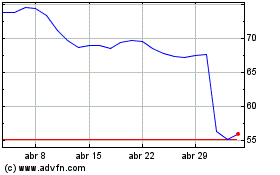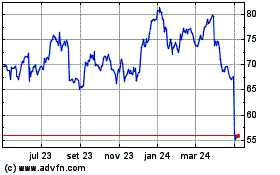U.S. index futures surged in pre-market trading
on Wednesday, driven by expectations of a Donald Trump victory and
Republican control of Congress, which could benefit companies
through his tax cut and tariff agenda. Trump reportedly secured 270
electoral votes, though other networks have yet to call the race.
Sectors like banking and healthcare led gains, while clean energy
stocks fell amid expectations of less regulatory support.
Investors bought dollars, bitcoins, and stocks while selling
bonds in response to Trump’s potential win and Republican control
of Congress. This scenario pushed stock futures to record highs,
strengthened the dollar, and boosted bitcoin above $75,000.
At 5:11 AM, Dow Jones futures (DOWI:DJI) jumped 1,177 points or
2.77%, S&P 500 futures rose 2.22%, and Nasdaq-100 futures
increased 1.71%. The 10-year Treasury yield stood at 4.428%.
A Trump win is expected to support tax cuts, deregulation, and
strengthening sectors like finance and tech, while also increasing
global volatility and Treasury yields. His victory would broadly
impact U.S. trade, tax, and climate policies, as well as
immigration, energy, and international conflicts.
Trump’s proposals include higher import tariffs, corporate tax
cuts, and increased fossil fuel production. He also advocates for
mass deportations, stricter borders, citizenship law changes, and
reevaluating U.S. support for Ukraine and NATO’s role.
In commodities, oil, metals, and grains fell due to the stronger
dollar as investors reacted to Trump’s potential victory. Soybeans
(CCOM:SOYBEAN) dropped 1.74%, and copper (CCOM:COPPER) -2.24%.
Gold (PM:XAUUSD) fell 0.75% to $2,725.635, as the dollar’s
strength made it pricier and higher Treasury yields pressured the
metal. Despite this, gold remains appealing as a safe haven amid
trade tensions and economic uncertainty, especially given Trump’s
proposed tariffs.
Oil prices declined after two days of gains.
Besides the dollar’s appreciation, U.S. crude inventory increases
exceeded expectations. If elected, Trump may enforce protectionist
policies affecting demand from China, the world’s largest importer.
The strong dollar makes oil more expensive for other nations,
reducing demand.
West Texas Intermediate crude for December fell 1.28% to $71.07
per barrel, while Brent for January declined 1.26% to $74.58.
In crypto markets, Bitcoin (COIN:BTCUSD) is up 6.2% over the
past 24 hours at $73,578 after reaching a record high of $75,410.10
overnight, fueled by the prospect of a Trump victory in the U.S.,
suggesting a more lenient approach to cryptocurrency regulation.
Investors speculate a Republican administration would encourage
innovation in the crypto sector. Ether (COIN:ETHUSD) is up 8.1% at
$2,618.
Today’s U.S. economic agenda includes the final October U.S.
services PMI at 09:45 AM, measured by S&P, previously at
55.3.
Asia-Pacific markets closed mixed on Wednesday. Japan’s Nikkei
225 rose 2.61%, and the Topix gained 1.94% on optimism around the
Bank of Japan’s policies. Meanwhile, South Korea’s Kospi dropped
0.52%, and Kosdaq fell 1.13%. Hong Kong’s Hang Seng lost 2.5% in
the final trading hour, while China’s CSI 300 closed down 0.5%.
Australia’s S&P/ASX 200 rose 0.83%.
China’s National People’s Congress is holding a five-day meeting
to discuss economic stabilization measures, drawing investor
attention for potential stimulus announcements and policy updates.
Additionally, the People’s Bank of China’s governor reiterated the
central bank’s commitment to supportive monetary policy to boost
economic growth, as reported by state media.
In Japan, manufacturing confidence declined in November,
impacted by China’s weakened economy and high inflation, according
to a Reuters survey. The services sector confidence dropped for the
fifth consecutive month, pressured by high costs and labor
shortages. Companies also cited currency market volatility as a
concern. The manufacturing sector confidence index fell to 5, while
services hit 19, the lowest since February 2023.
European markets are trading higher, led by gains in healthcare
stocks, with Siemens Healthineers (TG:SHL) and
Novo Nordisk (TG:NOV) among top performers, while
utilities lagged.
Novo Nordisk met quarterly profit expectations, while Siemens
Healthineers saw a 4.7% revenue increase for the fiscal year.
Other corporate highlights include BMW (TG:BMW)
reporting a 61% drop in quarterly profit due to weak sales in China
and brake issues. Revenue fell 15.7% to 32.4 billion euros, missing
analyst expectations. BMW expects a Q4 recovery with higher
deliveries and a more profitable product mix, aiming for an
operating margin between 6% and 7% for the year.
Puma (TG:PUM) posted a 5% increase in
currency-adjusted sales, reaching $2.48 billion, driven by demand
for running and soccer footwear. Its annual revenue and profit
forecast were maintained.
Marks & Spencer (LSE:MKS) reported
half-year profit of $524.6 million, beating expectations and up
17.2%, driven by market share gains. Revenue rose 5.7% with growth
in food and clothing sales, marking successful recovery efforts led
by CEO Stuart Machin.
Barry Callebaut saw annual revenue rise by
22.6% to 10.4 billion Swiss francs, passing cocoa costs onto
customers. However, sales volume remained flat due to high
ingredient costs and challenges in the gourmet division.
UniCredit (BIT:UCG) raised its 2024 profit
forecast above 9 billion euros and announced a 50% dividend payout
from 2025 profits. Q3 net profit was 2.51 billion euros, surpassing
estimates, with a 3% annual revenue increase driven by net interest
income.
Credit Agricole (BIT:1ACA) reported a 4.7% drop
in Q3 net profit to 1.67 billion euros ($1.83 billion), above the
forecast of 1.58 billion. Strong investment banking performance
offset retail weaknesses. Revenue grew 2.3%, with risk provisions
below expectations. The joint venture with Worldline remains on
track for March 2025.
Persimmon (LSE:PSN) reported growth in private
home sales in Q3 and projects annual growth, driven by autumn
demand. Improved affordability with more high loan-to-value
mortgages benefited buyers, especially first-time purchasers.
Microlise (LSE:SAAS) expects its services to
normalize by the end of next week following a recent cyberattack.
The company states the financial impact will be minimal, though
employee data was affected, with no customer data compromised.
Wizz Air (LSE:WIZZ) lost its appeal in the
General Court of Luxembourg against a 2 million euro aid granted to
TAROM by Romania, approved by the European Commission. The court
ruled the aid proportional and compliant with state aid rules.
Eurozone business activity stabilized in October, with the
services sector offsetting industrial decline. The Purchasing
Managers’ Index rose to 50.0 from 49.6 in September, indicating
economic stability. The services sector saw slight growth,
essential to avoid a recession. Demand for services dipped
slightly, but lower inflation and higher wages are expected to spur
consumer spending.
On Tuesday, U.S. stocks closed higher, led by a tech-driven
Nasdaq rally, up 1.4%, followed by the S&P 500 rising 1.2%, and
the Dow Jones 1.0%. Optimism was fueled by the tight Kamala
Harris-Donald Trump election race and a surprising acceleration in
the services sector, with October’s PMI rising to 56.0 from 54.9 in
September. The trade deficit increase also drew attention,
reflecting import growth.
Upcoming earnings reports include
Celsius (NASDAQ:CELH), CVS
Health (NYSE:CVS), Howmet
Aerospace (NYSE:HWM), Aurora
Cannabis (NASDAQ:ACB), Teva (NYSE:TEVA), Toyota (NYSE:TM), Six
Flags (NYSE:FUN), Johnson
Controls (NYSE:JCI)
and MarketAxess (NASDAQ:MKTX) before the
open.
After the close, results are expected from Arm
Holdings (NASDAQ:ARM), Qualcomm (NASDAQ:QCOM), AMC
Entertainment (NYSE:AMC), e.l.f.
Beauty (NYSE:ELF), Clover
Health (NASDAQ:CLOV), AppLovin (NASDAQ:APP), MercadoLibre (NASDAQ:MELI), Coeur
Mining (NYSE:CDE), Hecla
Mining (NYSE:HL)
and Albemarle (NYSE:ALB), among
others.
CVS Health (NYSE:CVS)
Gráfico Histórico do Ativo
De Dez 2024 até Jan 2025

CVS Health (NYSE:CVS)
Gráfico Histórico do Ativo
De Jan 2024 até Jan 2025
